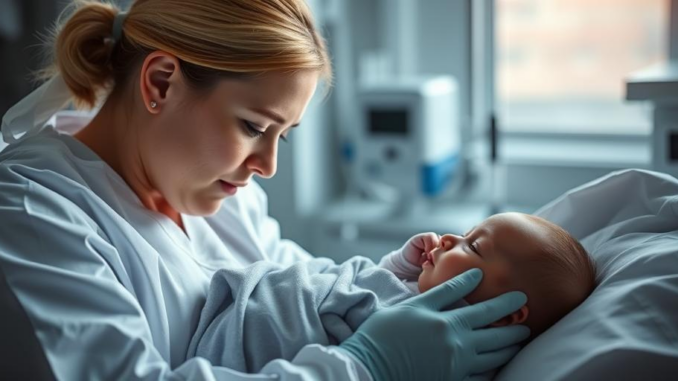
Summary
New research reveals a link between congenital heart defects (CHDs) in newborns and an increased risk of childhood cancer, especially those involving blood vessels or heart valves. Surprisingly, mothers of newborns with CHDs also face a heightened cancer risk. Further research is needed to explore the genetic and environmental factors contributing to this correlation.
Healthcare data growth can be overwhelming scale effortlessly with TrueNAS by Esdebe.
** Main Story**
Okay, so there’s some pretty interesting research coming out of the American Heart Association. It turns out there’s a link between congenital heart defects (CHDs) in newborns and a higher chance of them developing cancer later on. Makes you think, right?
Basically, researchers looked at data from over 3.5 million births in Korea over a period of about 15 years. They tracked these kids, as well as their mothers, for cancer diagnoses. The kicker? Newborns with CHDs had a 66% higher chance of getting cancer compared to those without. That’s… substantial.
And it gets even more specific. If the CHD affected blood vessels or heart valves, or if it was a complex defect, the risk more than doubled. Leukemia and non-Hodgkin lymphoma were the most common cancers they saw.
Maternal Risks Too
But hold on, there’s more! This is the part that really surprised me. The study also found that mothers of newborns with CHDs had a 17% increased risk of developing cancer themselves in that same ten-year period. 17%!
What’s behind this? The researchers aren’t entirely sure. They are pointing to potential genetic links, or maybe shared environmental factors playing a role. You know, maybe some genes passed down from mom create an environment that’s conducive to cancer in both her and the kid. It’s a theory, anyway. I’m not sure if they found that in the cohort that they looked at, but worth keeping in mind for future studies.
Implications for Pediatric Care
So, what does all this mean? Well, it definitely suggests we need a more holistic approach to caring for newborns with CHDs, and that includes their mothers. Maybe increased screening and earlier detection strategies for cancer are something we need to explore for these families. It certainly feels, like that should be a priority.
In my opinion, more research is critical. We need to really dig deep and understand what’s driving this connection between CHDs and cancer risk. Figuring that out could pave the way for preventative measures and, of course, better outcomes. No one wants to see a child, or their mother, suffer.
Think about it this way: I remember a case from my residency where we missed an early sign of leukemia in a child with a minor heart murmur. It wasn’t a CHD, but it made me realize how easily things can be overlooked when we’re not looking at the whole picture.
Advancements in Pediatric Diagnostics and Treatment
On the bright side, there have been amazing advancements in pediatric care lately. We’re talking innovative, non-invasive screening techniques that are revolutionizing early disease detection. Pretty amazing, right?
Also, targeted therapies are becoming more and more common. These treatments focus on specific disease pathways or genes, minimizing side effects and improving outcomes, particularly when it comes to cancer. And telemedicine is expanding access to specialized care, which is huge for underserved areas. Imagine being able to do virtual consultations and remotely monitor chronic conditions – that’s the future, right here.
These advancements are changing pediatric care. You’re seeing huge changes, and they’re improving the lives of children and their families. Telemedicine is not a total substitute of course, nothing beats an in-person consultation!
Looking Ahead
To sum it up, the link between CHDs and cancer is a big deal. As I see it, it’s something we need to take seriously. Research is absolutely essential to understand the connection and to develop preventative strategies.
Plus, the progress we’re making in diagnostics and treatments gives me hope for a brighter future for children with CHDs and other health challenges. It’s been fun, and educational, to chat through this with you!


This research highlights the critical need for expanded data collection and sharing across international healthcare systems. Pooling data could accelerate the identification of genetic and environmental factors, leading to more effective preventative measures and treatment protocols for both children and mothers.
I completely agree! The point you raise about international data sharing is so important. Imagine the insights we could gain by analyzing larger, more diverse datasets. This could really accelerate our understanding of the genetic and environmental factors at play, leading to more targeted interventions.
Editor: MedTechNews.Uk
Thank you to our Sponsor Esdebe
So, if Mom gives baby a CHD and then statistically *also* gets cancer, does that count as a buy-one-get-one-slightly-less-free deal from the universe? Seriously though, early detection sounds key here.
That’s a thought provoking, if slightly dark, way to look at it! Early detection is absolutely key. Exploring the genetic links and shared environmental factors could lead to more effective screening programs for both mothers and children. Thanks for raising this important point!
Editor: MedTechNews.Uk
Thank you to our Sponsor Esdebe
So, if we start screening newborns *and* their moms more intensely, does that mean pediatricians need to start boning up on their oncology knowledge? Asking for a friend who’s allergic to medical textbooks the size of small cars.
That’s a funny, but valid point! Perhaps this highlights the need for more collaborative, interdisciplinary training in medical school. Pediatricians with a foundational understanding of oncology could definitely improve early detection and referral processes. Maybe mini-oncology modules instead of car-sized textbooks?
Editor: MedTechNews.Uk
Thank you to our Sponsor Esdebe